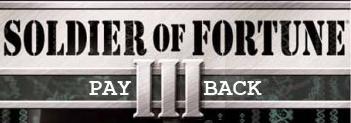|
|
|
|
Articles > Wounded Ronin - Soldier of Fortune: Payback
|
|
|
|
|

|
|
|
Soldier of Fortune: Payback Caused Me To Lose IQ
The third installment of the series, Soldier of Fortune: Payback caused me to feel a very poignant sense of grief as I played
it on my PC. The first two Soldier of Fortune games had given me so many positive memories and so many hours of immersive fun
over the years and so when Soldier of Fortune: Payback profoundly disappointed me in nearly every possible way a FPS game might
potentially disappoint a player I felt very let down as a long-time fan of the franchise. In particular, I felt that what had
been a very fun and well-made series had fallen victim to what many people call "console-itis"; cynical businesspeople with no
particular love of video games, intending to reach some supposed vast market of console players who hate complexity, content,
and depth in the games they play, bought the rights to use a well-loved title for no other reason than to boost sales, and
then produced an extremely simplistic low-quality product with little relation to its predecessors.
It seems like whoever was behind Payback completely failed to appreciate the realism and emphasis on tactics (up to and including
the use of a real life Vietnam veteran as a military consultant as part of game design) that distinguished its predecessor,
Soldier of Fortune: Double Helix. Instead, they thought that the entire appeal of the Soldier of Fortune series was the
supposedly "over the top gore" and slapped together Payback as a braindead gib factory packed with forgettable, tiny
environments. The gameplay was utterly simplistic to the extent that I felt I was playing a dumbed-down version of
Doom (at least in Doom you could still look at a level map and puzzle over where you should go next) with hit locations
and cinematics, and enemies blatantly and obviously spawning just around the next corner.
I even felt as though the ability to use any semblance of tactics was sacrificed to save system resources on a console.
Enemies blatantly spawn a short distance away such that the number of enemies in memory at any given time is minimized
and it's not possible to plan an approach to avoid them or stealthily eliminate them. This is in sharp contrast to the
Seaward Star and Vergara Manor levels of Double Helix, where enemies patrolled the map at various locations and the player
could try any number of routes and approaches to reach his goal, and the game distinguished between whether the enemies
were unaware of the player's presence or alerted to it. Besides for resource minimization directly reducing the quality
of gameplay, I felt as I was playing that I could see many cheap tricks the game designers were trying to pass off as
style but which were instead blatant devices to reduce the system demands made by graphics and rendering. For example,
whenever a player character reload animation took place, the rest of the screen not showing the reload animation would
blur. But everyone knows that a highly trained soldier wouldn't need to stare down at his rifle and ignore the enemies
in his field of view in order to perform a tactical reload, so I felt this was an extremely blatant ploy to have the
system not need to render both the reload animation and the environment in full detail at the same time. Similarly,
many of the levels had a fake "scratchy", jumpy overlay in imitation of a certain style of action cinema, but it seemed
to me like this was yet another sneaky way to try and make blurry graphics look artistic. I hardly need to mention
that Payback's single player campaign was extremely short, since most other reviewers have jumped on this point.
After I'd played through Payback I had the overwhelming impression of a chintzy, cheap game where corners had been
cut at every possible turn and furthermore that the game designers thought that I was extremely stupid, fixated on
gore alone, and wouldn't notice what they had done.
Setting aside the question of tactical game play in order to make a comparison with the largely non-tactical original
Soldier of Fortune game, Payback's drab levels and environments lacked the charm and memorableness of the original
Soldier of Fortune game. To this day, I consider Soldier of Fortune's African slaughterhouse level to be one of
the most entertaining and memorable FPS levels I've ever seen, but Payback's levels all blur together as a boring
blend of blurry jungles, huts, and ubiquitous exploding barrels, and a few indoor corridors. In the final level
of Soldier of Fortune, you got to storm a German castle with a nuclear launch taking place inside of it while
masculine, operatic music blared in the background; if nothing else the original Soldier of Fortune had humor,
charm, and I felt like the game designers really put their hearts into their ideas for the levels. For better
or for worse they took artistic risks and erred on the side of the outrageous or humorous. But what else can
I say about the painfully generic levels of Payback besides that they were completely forgettable? I really felt
that they had no heart.
Ultimately, Soldier of Fortune: Payback has the distinction of being a FPS game in a series I like in a genre I like but
which simultaneously brings absolutely nothing positive or pleasurable to the gaming table. Every possible thing it
could do wrong it does wrong, and probably the only positive thing I can say about it is that it didn't crash
while I was playing it but on the contrary was rather stable. I often feel like I'm one of the most positive
PC game reviewers on the internet and that I take the time to really explore games and find out the unique,
positive things that each title offers. But this time, my usual optimism and open mindedness doesn't
help at all...no matter how hard I try, I can't find a single positive or redeeming quality of Soldier of Fortune: Payback.
Instead, it actually manages to make me sad.
|
|
|
|
-- Wounded Ronin (11/12/2008)
|
|
|
|
|
|
|
|
|
|
|
|
|
Toy Fair Catalogs
|
|

|
|
|
|
|
|
Hobby Catalogs
|
|

|
|
|
|
|
|
Magazine Archive
|
|

|
|
|
|
Featured Toy Lines
|
|

|
|

|
|

|
|

|
|

|
|

|
|

|
|
|
New Additions
|

|
Playthings Magazine
March, 1987
|
|
|

|
Play Meter Magazine
April 15, 1985
|
|
|

|
Yahoo! Internet Life Magazine
August, 2001
|
|
|

|
The Pinball Trader
July, 1986
|
|
|

|
IEEE Internet Computing
July/August, 2005
|
|
|

|
Science Activities
November, 1973
|
|
|

|
NASA Station Break Newsletter
June, 1991
|
|
|

|
Countdown Magazine
December, 1990
|
|
|

|
The Bisquick Banner
March/April, 1984
|
|
|

|
NASA Activities Newsletter
September, 1983
|
|
|

|
Egon
w/ Symmetrical Book Stacking
|
|
|
Conventions
|
|

|
|

|
|

|
|

|
|

|
|

|
|

|
|

|
|

|
|

|
|

|
|

|
|
|
|










